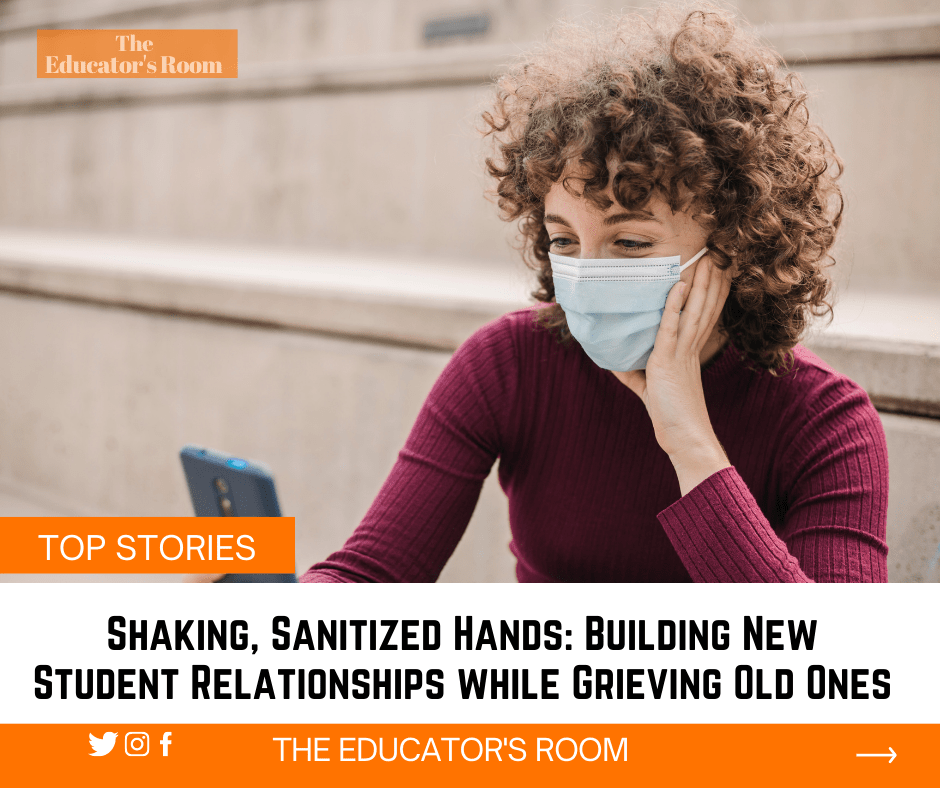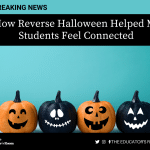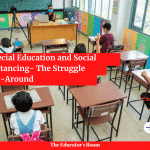My hands were shaking as the bell rang for the first day of the 2020-2021 school year. I know it sounds cliche to say that my hands were shaking. Everyone writes that their hands were shaking to indicate nervousness but I’m not being hyperbolic when I say that my hands were literally shaking so hard that it was hard to take roll. My mask (which I’d been wearing dutifully for months while rolling my eyes at mask-related complaints I would hear at the grocery store or read on Facebook) made me suddenly feel claustrophobic and I had to remember not to hold my breath. Reminding myself to breathe has been a common occurrence throughout this pandemic, as have other small moments of self-care. I now have a podcast to help me sleep and a breathing technique that was recommended to me by a friend, two brand new necessities that did not exist to me on December 31, 2019.
As I propped open the door to prepare myself for a brand new set of students, I heard a student from the 2019-2020 school year call my name. I smiled and waved and she walked over to see me. She told me that she had missed me in the spring. I said that I had missed her too and that I hoped she had a really great year ahead of her. As she walked away, the anxiety of what was to come this school year was replaced with an overwhelming (and unexpected) feeling of grief.
My 2019-2020 students were special.
They were goofy but willing to work.
They were awkward but empathetic to those who were different.
They struggled, but they were smart.
They were kind to one another and kind to me.
The year 2020 started off particularly rough for me when my Dad, who had suffered from End-Stage Renal Disease and waited for a kidney transplant for 8 long years, passed away on January 1, 2020. I wasn’t there to greet my students when they came back to school after Christmas break, but instead was attending my father’s funeral. I dreaded coming back to work, but when I did, I found a poster board from all my students covered in beautiful condolences. One student had painted a canvas with the words “Students: We’ll be there for you” in the style of Friends, my favorite TV show. I had built meaningful relationships with this group and bonded with them through my own personal trauma and eventually, our shared cultural traumas as we navigated through the beginnings of the COVID-19 pandemic.
As my hands shook and I reminded myself to breathe that first day this school year, I knew that the question that hung over my head wasn’t about how to handle the extra workload that comes with hybrid learning. It wasn’t about how to teach my new students everything I needed to teach them with half the face-to-face time of a normal school year.
It was several questions, all centered around building relationships.
How could I replicate the strong relationships I had with cohorts of years past with this brand new set of students who I only see once a week?
How could they trust me to teach them when they didn’t know me?
How could I show them that I care about their success in my class when I can’t even show them my facial expressions?
How could I convince them to “buy-in” to their own learning when it would rely so much on personal motivation, something that’s hard to get from teenagers even in the most ideal settings?
We’re nearing the end of the first semester and I’d like to tell you how the anxiety over getting to know my new set of students was a complete overreaction on my part. I’d like to tell you it came naturally and how it really wasn’t any different than any other year when it really came down to it. I’d like to tell you I’ve learned plenty about each of my student’s motivations or their individual academic and emotional struggles. I really do wish I could say all of that but the truth is that it’s been rough. There are some classes that have opened up so that the vibe feels almost normal, with a healthy dose of participation and natural comfort in sharing thoughts (the key, in my opinion, to an English classroom).
[bctt tweet=”In other classes, we sit in awkward silence after every single question I ask until finally someone mumbles an answer and everyone else (including me) breathes a sigh of relief knowing that we can move on. ” username=””]
One of my current students told me just yesterday that she didn’t know how she was going to get through this year in English class during the first couple of weeks. She said I seemed perpetually annoyed at first, but now she knows that I’m (in her words) “chill.” I’ve heard this term before from past students and I always worried that it meant I wasn’t a good teacher. I’ve always wondered if I’m strict enough to teach high school students. I panicked over if giving students a chance to resubmit work they didn’t do well on meant that I was teaching them that the quality of their work didn’t matter because they could always redo it if they failed OR if it meant that I was showing them that it’s okay to make mistakes sometimes as long as you continue to better yourself. Did allowing our class discussions to occasionally go off on a tangent teach them that our subject matter wasn’t important, or did it show that their feelings on a variety of topics were valid?
And even while stressing over being too chill, I worried about losing my chill. I switched things up this year to crack down on late assignments, something I was terrible at enforcing in the past. It took a lot of consideration and was a complete 180 on how I did things in the spring. My mindset then was that we are in the midst of a situation that our students and teachers have not faced before. It would be best to give leniency and remember the struggles of the students who may not have wifi or would be babysitting their siblings. I still am careful to consider those things as we have continued in a hybrid schedule through the fall, but I felt my students might need some kind of structure to their lives. My mindset now is that they need firm boundaries and strict deadlines to feel some sense of normalcy or routine in a world where all of the rules and guidelines and mandates are constantly changing. I hope that I can provide some kind of stability to a completely unstable world. They stumbled at first, of course, but as time goes on, I notice that they’re recognizing the importance of accountability and their work quality is slowly improving.
Most importantly, the relationships are developing, even though it’s at a much slower pace than a normal year. At the beginning of the year, my classes were eerily quiet. They’re a little louder now. They’re starting to get to know me and they’ll laugh when I’m making a joke. I’m starting to see the little signs that they put out there to show they’re confused. I don’t know if I would recognize them without their masks and on the occasions where I see the bottom half of their faces if they’re taking a sip of water, it is weirdly shocking! I’m a little sad thinking that by the times we all start to feel completely comfortable with one another, the year will be over.
I don’t know if they’ll understand the subject according to the level they’re “supposed” to be at, but I do know that they’ll come out of the pandemic as better human beings. They’ll understand the importance of connections between people. They’ll be compassionate towards those in difficult situations. They’ll know how to manage their time, how to work hard, and how to self-motivate. I don’t know if I’m doing a great job of teaching them these things, but I hope I am.






